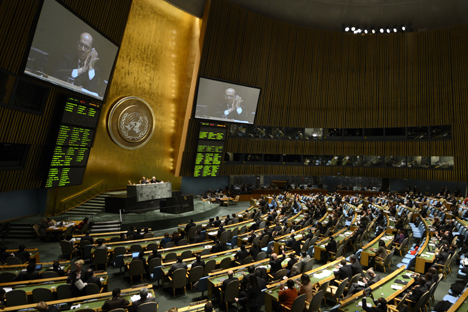UN General Assembly approves arms trade rules

UN General Assembly approves arms trade treaty. Source: AFP / East News
On 2 April, the UN General Assembly approved the world’s first universal international arms trade treaty defining the rules of the game on this $70 billion market. The official UN tally showed 154 votes in favour, including the US, out of 193 UN member-states, three against (Iran, Syria and DPRK) and 23 abstentions, including Russia, India and China.
The treaty covers all types of transaction involving conventional arms: export, import, leasing and transit, and envisages creation of registers of arms transactions in the signatory states.
The document also bans transfer of arms if the supplier has evidence that they will be used in acts of genocide or crimes against humanity, serious violations of the Geneva conventions, attacks on civilian facilities or civilians.
The document was, therefore, backed by the leading international human rights organisations, including Amnesty International. The countries that signed the treaty will have to send annual reports to the UN Secretariat on their compliance with it.
Related
Russia can respond to growing competition on world arms market
The document does not stipulate that arms should not be provided to militants and has vague provisions pertaining to humanitarian issues, which may later result in multiple interpretations, including unscrupulous ones, Russia’s Ambassador to the United Nations Vitaly Churkin said when explaining Moscow’s stance in his speech at the General Assembly. Syria, Indonesia and Nicaragua also mentioned the danger of arms transfers to militants.
Ahead of approval of the document, Mikhail Ulyanov at the Russian Foreign Ministry called the treaty “a weak, carelessly formulated document” that requires finalisation.
“We suggested taking things slowly and refraining from approving or recommending an inadequately though-out text. Instead of approving it, the General Assembly could have reported that certain progress had been achieved but talks were still under way, and the mandate of the conference needed to be extended for two or three weeks, for it to reconvene in November or December and continue its work”, he said.
The head of the Russian delegation, Vitaly Churkin, made a similar statement before the treaty was put to the vote. He explained that there were many inaccuracies in the document. Specifically, Churkin noted that the treaty failed to describe “clear humanitarian criteria for assessing the risks, which can be treated ambiguously by some nations for political reasons.”
In order for the treaty to come into effect, it must be ratified by 50 nations.
Vedomosti quotes Sergei Denisentsev, an expert at the Centre for Analysis of Strategies and Technologies, who says that approval of the treaty does not mean that large arms exporters and importers will ratify it any time soon or, indeed, at all.
One member of the treaty-drafting conference, Vadim Kozyulin, Director of the Conventional Arms Programme at the Russian Political Studies Centre, believes that the 154 votes in support of the treaty indicated that the document would eventually be ratified. The only question is whether the major suppliers will ratify it as well.
The expert said that Washington, too, has doubts as to whether the treaty is indispensable. The powerful US arms lobby opposes the treaty.
According to Kozyulin, the document bans arms exports to regions with reported incidents of serious human rights violations. The same principle is part of the US arms export legislation. Yet this has never prevented Washington from delivering arms to Iraq and Afghanistan, despite the fact that the international community pointed to the mass violations of human rights there.
Kozyulin said it was a ‘tricky wording’ that would entitle some nations to demand that Washington stop supplying arms to its allies in some situation. Nevertheless, the US has no objections to the treaty.
The expert said that, should major arms suppliers ratify the document, it would affect the situation in Syria, because “a platform is being established in the UN” for discussing the humanitarian aspect of arms supplies, both to the Syrian government and militants.
“If this issue is raised at all, there will be no avoiding it. It will remain the permanent ‘irritation factor’ for the Russian administration”, Kozyulin says.
The article is a combined report based on Vedomosti and Vzglyad materials
All rights reserved by Rossiyskaya Gazeta.
Subscribe
to our newsletter!
Get the week's best stories straight to your inbox
.jpg)